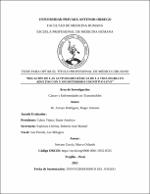Relación de las actividades básicas de la vida diaria en adultos con y sin deterioro cognitivo leve

View/
Download
(application/pdf: 863.8Kb)
(application/pdf: 863.8Kb)
Date
2021Author(s)
Arroyo Rodríguez, Roger Antonio
Metadata
Show full item recordAbstract
Determinar la relación entre las actividades básicas de la vida diaria en adultos con
deterior cognitivo leve.
Material y métodos. El presente estudio de análisis de asociación, presento dos Test, uno
busca si existe dependencia en las actividades básicas de la vida diaria con el Índice de
Barthel, donde se consideró ≤ 95 puntos un paciente ABVD dependientes; y el otro busca si
hay presencia de deterioro cognitivo leve con el Montreal Cognitive Assessment (MoCA),
donde se consideró ≤ 23 puntos un DCL presente. 202 adultos mayores (≥ 65 años) fueron
encuestados de manera multicéntrica, en distintos Centros de Salud Mental Comunitaria –
Trujillo: Trujillo, Florencia de Mora, San Crispín, y El Porvenir.
Resultados. La relación de asociación entre deterioro cognitivo leve y las actividades básicas
de la vida diaria, resulto significativo (p=0.000), el estadístico V de Cramer dio como
resultado 0.334, el cual representa un nivel de asociación moderada. Del 100% (202), 80.7%
(163) de adultos mayor que en las actividades básicas de la vida diaria son dependientes,
bien, ahora en los adultos mayor, la mayor dependencia en las actividades básicas de la vida
diaria es subir y bajar escaleras (76.2%=154) y la menor dependencia es control de heces
(3.5%=7). Se observó que el menor dominio cognitivo comprometido del deterioro cognitivo
leve es Vigilancia y Administración (Atención: tarea de atención sostenida), y el mayor
motivo de deterioro cognitivo leve presente es el dominio cognitivo Memoria-Recuerdo
Diferido.
Conclusiones. Existe una asociación entre deterioro cognitivo leve y las actividades básicas
de la vida diaria, con un nivel de asociación moderado. Además, las actividades básicas de
la vida diaria en adulto mayor se asocian a la mayor ocurrencia de deterioro cognitivo leve,
y se considera un factor de riesgo. Determine the relationship between basic activities of daily living in adults with
mild cognitive impairment.
Material and methods. The present study of association analysis, I present two tests, one
looks for whether there is dependence on the basic activities of daily life with the Barthel
Index, where a dependent ABVD patient was considered ≤ 95 points; and the other seeks if
there is a presence of mild cognitive impairment with the Montreal Cognitive Assessment
(MoCA), where ≤ 23 points was considered a DCL present. 202 older adults (≥ 65 years old)
were surveyed in a multicenter manner, in different Community Mental Health Centers -
Trujillo: Trujillo, Florencia de Mora, San Crispín, and El Porvenir.
Results The association relationship between mild cognitive impairment and basic activities
of daily living, was significant (p = 0.000), Cramer's V statistic resulted in 0.334, which
represents a moderate level of association. Of the 100% (202), 80.7% (163) of adults older
than the basic activities of daily living are dependent, well, now in older adults, the greatest
dependence on the basic activities of daily living is up and down stairs (76.2% = 154) and
the least dependence is stool control (3.5% = 7). It was observed that the least compromised
cognitive domain of mild cognitive impairment is Surveillance and Administration
(Attention: sustained attention task), and the greatest reason for mild cognitive impairment
present is the Deferred Memory-Memory cognitive domain.
Conclusions There is an association between mild cognitive impairment and basic activities
of daily living, with a moderate level of association. In addition, the basic activities of daily
living in older adults are associated with the greater occurrence of mild cognitive impairment,
and it is considered a risk factor
Collections
- Medicina Humana [2969]

